|
|
|
Sort Order |
|
|
|
Items / Page
|
|
|
|
|
|
|
| Srl | Item |
| 1 |
ID:
159867
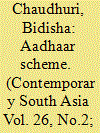

|
|
|
|
|
| Summary/Abstract |
The burgeoning influence of liberal market economy coupled with a ‘good governance’ paradigm across post-communist and post-colonial states emphasizes a market concept of equality, while turning ‘citizens’ into ‘customers’. This trend has been further accentuated by the massive inlets of Information Communication Technologies into governance mechanisms having a significant impact on the ways of governmentality and thereby on the substance and processes of documenting citizenship. It is in this wider context of intersecting economic and political changes that this paper captures the shifting regimes of citizenship in India as manifested through the processes of Unique Identification, or Aadhaar scheme, an initiative by the Government of India that seeks to give every Indian resident a unique identity documentation. Although Aadhaar does not authenticate citizen identity, nonetheless, in its promise to build a ‘national grid’ of identity information infrastructure, it indicates a meta-structure of a new inclusion/exclusion paradigm of citizen formation in India that appears to reinvent early liberal values of civic republicanism based on property rights. Rather than assessing the merits of this scheme, this paper demonstrates how new technologies of governmentality could impact the citizenship regime in India while keeping with the demands of a growing neo-liberal political economy.
|
|
|
|
|
|
|
|
|
|
|
|
|
|
|
|
| 2 |
ID:
096751
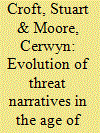

|
|
|
|
|
| Publication |
2010.
|
| Summary/Abstract |
This article examines the evolution of threat narratives in the age of terror, focusing on the United Kingdom. The analysis is broken down into two sections. The first part of the article presents four distinct and yet overlapping notions of the threats which have influenced both the West, and more specifically the UK, in debates about counterterrorism since 9/11. The four threat narratives-Al-Qaeda as a central organization; decentralized terror networks; home grown; and finally apocalyptic threats-have all been used to inform counter terror measures in the West. The second section of the article argues that terrorism has evolved strategically, and is hybridized owing to the security environment-interpenetrated by globalization, digital media and information communication technologies-in which it occurs. The article concludes with a preliminary discussion of some strategic and operational themes which have influenced the form and character of terrorism and insurgency, exploring how they impact on the ways in which threats are constituted and countered, illustrating that what is new maybe the nature of our own fears.
|
|
|
|
|
|
|
|
|
|
|
|
|
|
|
|
| 3 |
ID:
046222
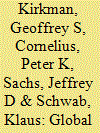

|
|
|
|
|
| Publication |
New York, Oxford University Press, 2002.
|
| Description |
xvi, 385p.
|
| Standard Number |
0195152581
|
|
|
|
|
|
|
|
|
|
|
|
Copies: C:1/I:0,R:0,Q:0
Circulation
| Accession# | Call# | Current Location | Status | Policy | Location |
| 046075 | 384.3028506/KIR 046075 | Main | On Shelf | General | |
|
|
|
|
| 4 |
ID:
119699
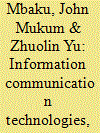

|
|
|
| 5 |
ID:
113374
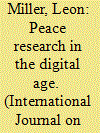

|
|
|
| 6 |
ID:
160928
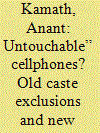

|
|
|
|
|
| Summary/Abstract |
This paper presents a fresh perspective on the complicated relationship between digital communication technologies and historically disadvantaged castes such as Dalits in peri-urban Bangalore (Bengaluru), India, a city popularly perceived as India’s “Silicon Valley.” Based on interviews with Dalit household members, entrepreneurs, and political activists, the study examines whether mobile phones have been insufficiently harnessed by Dalits in the region to overcome historic deprivation, or whether they may have even assisted in the reinforcement of caste-based exclusion. The paper uses oral histories and draws from feminist perspectives on technology to demonstrate how the contemporary socio-technological outcomes among Dalits in peri-urban south Bangalore is a result of a convergence between three elements – the durability of caste in peri-urban metropolitan India, the social construction of the usage of information communication technologies (ICTs), and myopia in the conventional understanding of the digital divide in India. In the process of disentangling this convergence, the paper offers a new perspective on the relationship between caste, ICTs, and development policy. The paper ultimately argues for a re-examination of the idea of a digital divide and the development assumption that access to new technologies will further positive development outcomes.
|
|
|
|
|
|
|
|
|
|
|
|
|
|
|
|
|
|
|
|
|